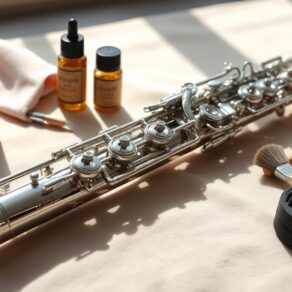If you notice a decline in sound quality, such as muffled notes or uneven projection, it's time for a tune-up. Unresponsive keys that stick or require extra pressure indicate misalignment or dryness. Look for visible physical damage like dents or cracks; these affect both playability and sound. Unusual noises—clicks, pops, or rattles—suggest misaligned pads or loose screws. Difficulty in tuning and frequent adjustments signal worn pads or misaligned components. Addressing these issues promptly can enhance your flute's performance and longevity. Explore the specifics to confirm your instrument stays in prime condition.
Key Takeaways
- Decreased sound quality, such as muffled notes or lack of tonal clarity, indicates potential issues needing inspection.
- Unresponsive keys that stick or require extra pressure suggest misalignment or dry pads that require professional attention.
- Visible physical damage like dents, scratches, or cracks can significantly alter sound and performance, necessitating a tune-up.
- Unusual noises during play, such as clicks or hissing, may signal misaligned pads or leaks, indicating the need for maintenance.
- Difficulty in tuning, including sharp or flat sounds, may indicate misalignment or worn pads that require professional assessment.
Decreased Sound Quality
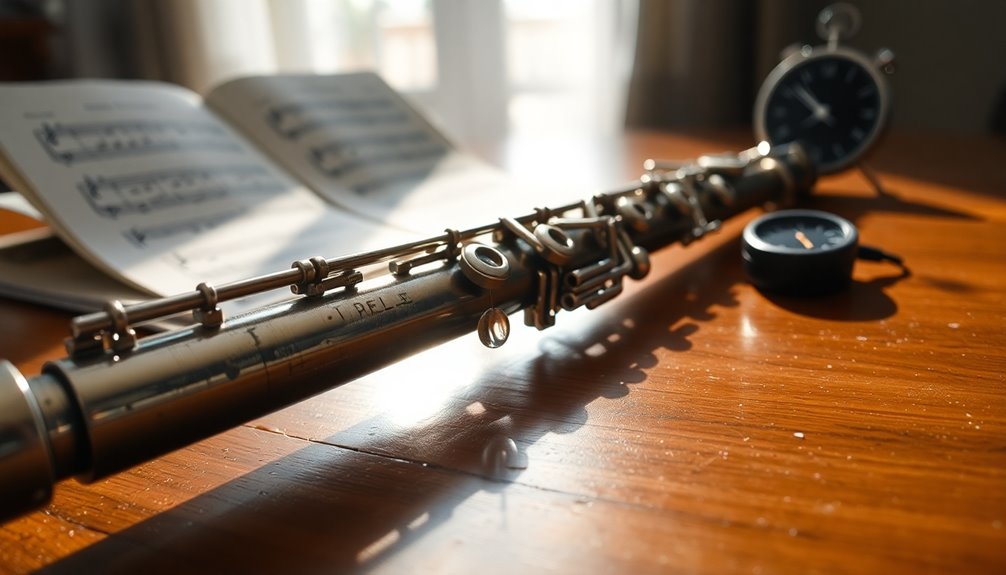
A noticeable decrease in sound quality can be a clear indicator that your flute needs a tune-up. When you find that your instrument's sound projection isn't reaching the audience like it used to, it's time to assess the situation. Poor sound projection can stem from various factors, including wear and tear on pads or misalignment in the flute's body.
You might also notice a lack of tonal clarity. If your notes sound muffled or uneven, don't ignore these signs. Tonal clarity is essential for expressing the nuances of your music, and any compromise in this area can affect your performance. This could be due to loose or damaged components, which can disrupt airflow and impact your sound.
To restore your flute's brilliance, consider seeking a professional who can conduct a thorough inspection. They'll make sure that each key and pad functions effectively, allowing your flute to deliver the rich, vibrant tones you crave. Regular maintenance, including cleaning and care supplies, can help prevent these issues from arising in the first place.
Unresponsive Keys

When sound quality diminishes, unresponsive keys often follow as a symptom of a deeper issue. You might notice that certain keys don't return to their original position or require extra pressure to activate. This can stem from improper key alignment, where the mechanism is misaligned, preventing smooth operation. Regular play can shift the keys slightly, making them less responsive over time.
Additionally, key lubrication plays a vital role in ensuring your flute functions effectively. If the key pads are dry or the mechanical parts lack sufficient lubricant, you'll likely experience sluggishness in your playing. When you press a key, it should feel fluid and effortless; any resistance may indicate that it's time for a tune-up. Regular inspection of key alignment and lubrication is essential for optimal performance.
Addressing unresponsive keys isn't just about comfort in playing; it's about reclaiming the beautiful sound your flute is capable of producing. If you're experiencing these issues, don't hesitate to consult a professional.
They can assess and adjust key alignment, apply the right lubrication, and restore your flute to its full capability. You deserve an instrument that performs beautifully, enhancing your musical experience.
Visible Physical Damage
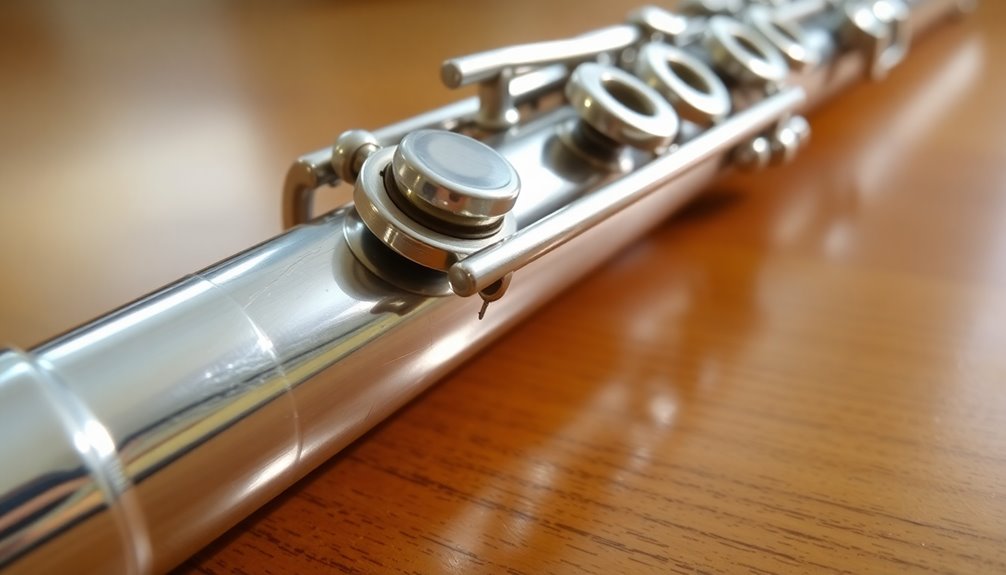
Visible physical damage on your flute can greatly impact its performance and sound quality. When you notice dents, scratches, or bent keys, it's vital to address these issues promptly. Such damage can affect the alignment of your instrument, leading to compromised airflow and intonation.
Regular flute maintenance tips suggest performing a visual inspection to catch any signs of wear before they worsen.
Identifying repairs starts with evaluating the condition of your flute. Check for cracks in the body or headjoint, as these can considerably alter your sound. If the pads are worn or if you see any visible separation between the pads and tone holes, it's time to seek professional help. Regular cleaning with a flute cleaning kit can also help maintain your instrument's condition.
Additionally, watch for any loose or misaligned keys, as they can hinder your playing experience.
Don't underestimate the importance of maintaining your instrument's integrity. You've invested time and money into your flute, so ensuring it's in prime condition is essential for your musical journey.
A professional can provide the expertise needed to restore your flute, enhancing both its playability and your enjoyment. Investing in these repairs keeps your connection to music strong and vibrant.
Unusual Noises During Playing
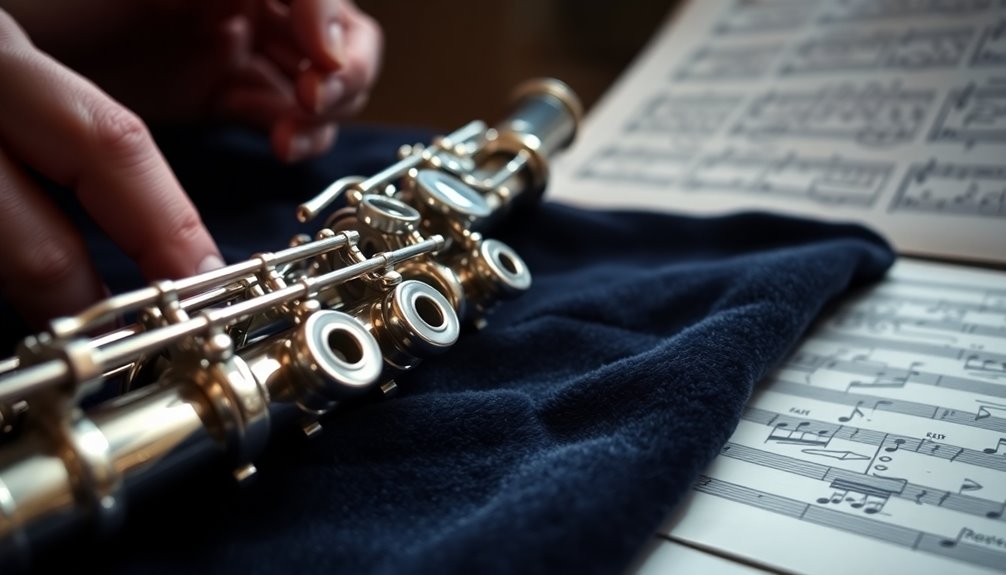
Even with no visible physical damage, your flute might produce unusual noises while playing, indicating underlying issues that need attention. These sounds often manifest as clicks, pops, or an inconsistent tone, which can be frustrating and distracting. Such noises may arise from a variety of causes, including misaligned pads, dirt buildup, or mechanical wear that affects the flute's air column.
When you encounter these disturbances, it's vital to conduct a thorough sound inspection. Listen closely as you play, noting any irregularities in sound. If you hear a persistent rattling, it might suggest loose screws or components that require tightening.
Additionally, if your flute produces a hiss or breathy sound, this could indicate leaks in the pads that need replacing. Regular cleaning and maintenance practices are crucial for preventing tarnish and corrosion that can contribute to these issues.
Regular flute maintenance is essential to prevent these issues from escalating. Addressing unusual noises promptly not only enhances the quality of your sound but also prolongs the life of your instrument.
If you're unsure about the source of the problem, don't hesitate to consult a professional technician. They can accurately diagnose the issue and restore your flute to its best condition, ensuring that your music flows beautifully once again.
Difficulty in Tuning
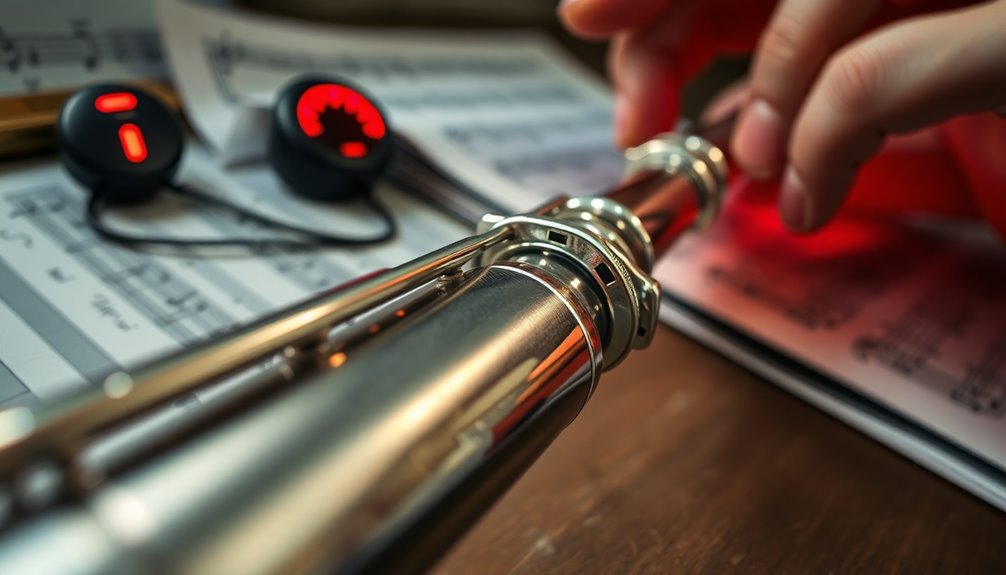
Struggling with tuning your flute can be both frustrating and disheartening, especially when you're preparing for a performance or practice session. If you find that no matter what tuning techniques you apply, your flute just won't cooperate, it's a clear sign that professional flute maintenance may be necessary.
Here's a quick reference to help you identify common tuning issues:
| Issue | Possible Cause | Recommended Action |
|---|---|---|
| Flute sounds sharp | Headjoint misalignment | Adjust headjoint position slightly |
| Flute sounds flat | Temperature changes | Allow flute to acclimate to room temp |
| Inconsistent tuning | Worn pads or corks | Replace pads or corks |
| Difficulty with octaves | Misaligned tone holes | Consult a professional technician |
When tuning becomes a persistent challenge, it's crucial to evaluate your flute's condition. Regular maintenance can prevent tuning issues and enhance your playing experience. Additionally, regular cleaning can help maintain the instrument's overall performance. Don't hesitate to reach out to a technician who understands your instrument. You're part of a community that values precision and sound; let's keep your flute in top shape together!
Frequent Need for Adjustments
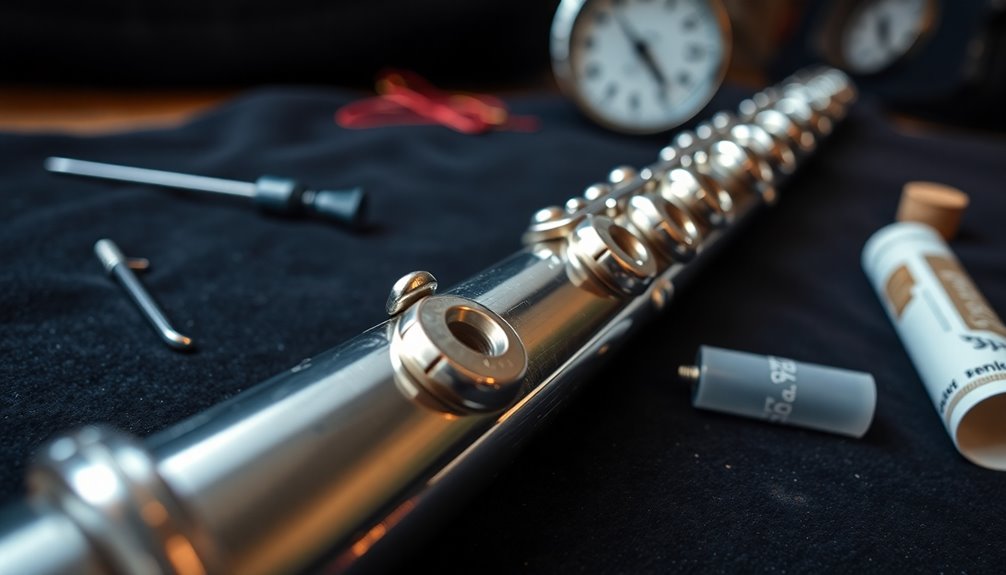
Frequent adjustments to your flute can indicate underlying issues that may require attention. If you find yourself needing constant tweaks, it's a sign your instrument mightn't be performing at its finest. You may notice sticking keys, misaligned pads, or inconsistent sound production.
These problems often stem from wear and tear, environmental factors, or improper handling, all of which can affect your flute's overall functionality. To guarantee peak performance, regular maintenance is vital. If you're frequently adjusting your flute, it's important to seek professional help. A skilled technician can diagnose and address the root causes, making sure your instrument operates smoothly.
Not only will this enhance your playing experience, but it'll also lead to significant performance improvement. Regular cleaning and maintenance, including the use of comprehensive cleaning kits, can help prevent many of these issues from arising in the first place.
Frequently Asked Questions
How Often Should I Schedule a Flute Tune-Up?
You should schedule a flute tune-up at least once a year, but if you notice signs of wear—like sticky keys or uneven tone—don't wait.
Regular flute maintenance tips suggest checking your instrument regularly for damage. If you play frequently, consider biannual appointments to keep it in peak condition.
Staying proactive guarantees your flute performs well and maintains its value, fostering a deeper connection to the music you love.
Can I Clean My Flute Myself?
Yes, you can clean your flute yourself!
For effective flute maintenance, use a soft cleaning cloth and a cleaning rod with a cloth to remove moisture from the inside. Avoid harsh chemicals; instead, stick to mild soap and water for the exterior.
Regularly check for debris around the pads and keys. Investing in quality cleaning supplies will guarantee your flute stays in top shape, allowing you to enjoy playing even more!
What Are the Costs Associated With a Professional Tune-Up?
When you consider the costs associated with a professional tune-up, think of it as investing in a symphony of sound.
Tune-up pricing can vary, typically ranging from $50 to $150, depending on the technician's expertise and your flute's condition.
The maintenance benefits are substantial; with proper care, your instrument can produce richer tones and better intonation.
How Long Does a Typical Flute Tune-Up Take?
A typical flute tune-up usually takes about one to two hours, depending on the condition of your instrument.
While you can follow some DIY flute care and maintenance tips to keep it in good shape, a professional will guarantee everything is adjusted perfectly.
Regular appointments help maintain peak performance and sound quality, so don't hesitate to schedule one.
You'll feel a sense of belonging in the musical community by prioritizing your flute's care.
Will a Tune-Up Improve My Playing Skills?
You might think of a flute tune-up like a software update for your favorite app—it enhances performance.
When you get a professional tune-up, you'll notice significant technique improvement and sound quality. A well-maintained flute responds better, allowing you to play with greater ease and precision.
It's not just about fixing issues; it's about optimizing your instrument so you can truly express yourself. You'll feel more connected to your music and community.
Conclusion
If you're noticing decreased sound quality or unresponsive keys, it might be time to contemplate a professional flute tune-up. Don't wait until the unusual noises become unbearable or visible damage worsens. Each moment you play with these issues could lead to more significant problems down the line. Trust the signs your instrument is showing you—your flute deserves the best care. Will you risk losing that beautiful sound forever, or will you take the necessary step towards restoration?





